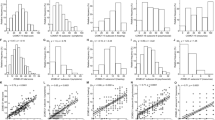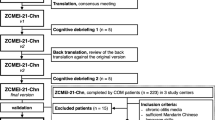Abstract
Because existing patient-reported outcome measures (PROMs) specific for chronic otitis media (COM) are lacking certain relevant symptoms and dimensions of health-related quality of life (HRQoL), we aimed to develop and validate a new questionnaire for comprehensively measuring HRQoL in adult patients with COM. An expert panel and patients were involved in developing the first version of the Zurich chronic middle ear inventory, containing 33 items (ZCMEI-33). An electronic application was chosen not only to provide maximal data quality, but also to facilitate and accelerate data analysis. Item reduction was performed by testing the questionnaire in a first cohort (n = 85). Using sequential statistical analysis, the ZCMEI-33 was reduced to 21 items (ZCMEI-21). Subsequently, the ZCMEI-21 was validated in a second cohort (n = 76). Validation revealed a Cronbach’s α of 0.91, indicating excellent internal consistency. Moreover, the ZCMEI-21 was able to discriminate between patients with COM and healthy participants (p < 0.0001), thus possessing good discrimination validity. Assessing criterion validity, the ZCMEI-21 total score was compared to a question directly addressing HRQoL and the EQ-5D descriptive system score, a generic measure of HRQoL. Whereas the ZCMEI-21 total score and the EQ-5D descriptive system score were only moderately correlated (r = 0.60, p < 0.0001), the ZCMEI-21 total score and the question directly addressing HRQoL showed a strong correlation (r = 0.74, p < 0.0001). In conclusion, sufficient information on reliability and validity was obtained to propagate the application of the ZCMEI-21 to quantify HRQoL in patients with COM.


Similar content being viewed by others
Abbreviations
- BYOD:
-
Bring your own device
- CES:
-
Chronic ear survey
- COM:
-
Chronic otitis media
- COMOT-15:
-
Chronic otitis media outcome test
- COMQ-12:
-
Chronic otitis media questionnaire
- EORTC QLQ-C30:
-
European Organization for Research and Treatment of Cancer Quality of Life Questionnaire
- ePROM:
-
Electronic patient-reported outcome measure
- EQ-5D:
-
European quality of life-5 dimensions questionnaire
- HRQoL:
-
Health-related quality of life
- ITC:
-
Item total correlation
- max:
-
Highest value
- min:
-
Lowest value
- OMCC:
-
Chronic otitis media with cholesteatoma
- OMCS:
-
Otitis media chronica simplex
- PCA:
-
Principal component analysis
- PRO:
-
Patient-reported outcome
- PROM:
-
Patient-reported outcome measure
- Q:
-
Question (“item”)
- SD:
-
Standard deviation
- SNOT-20:
-
Sinonasal outcome test
- ZCMEI-21:
-
Zurich chronic middle ear inventory, final version containing 21 questions
- ZCMEI-33:
-
Zurich chronic middle ear inventory, first version containing 33 questions
References
Epstein RS, Sherwood LM (1996) From outcomes research to disease management: a guide for the perplexed. Ann Intern Med 124:832–837
Black N (2013) Patient reported outcome measures may transform healthcare. Br Med J 346:19–21
Guyatt GH, Feeny DH, Patrick DL (1993) Measuring health-related quality of life. Ann Intern Med 118:622–629
Bhattacharyya N (2004) Outcomes research in otology. ORL 66:214–220
Coons SJ, Eremenco S, Lundy JJ et al (2014) Capturing patient-reported outcome (PRO) data electronically: the past, present, and promise of ePRO measurement in clinical trials. Patient 8:301–309
Guyatt GH, Bombardier C, Tugwell PX (1986) Measuring disease-specific quality of life in clinical trials. Can Med Assoc J 134:889–895
Alakärppä A, Alho O-P (2012) Patient-recorded outcomes and quality of life in evidence-based medicine databases on most common ear, throat and nose procedures: a systematic review. Clin Otolaryngol 37:436–445
Piccirillo JF, Merritt MG, Richards ML (2002) Psychometric and clinimetric validity of the 20-item Sino-Nasal Outcome Test (SNOT-20). Otolaryngol Head Neck Surg 126:41–47
Bjordal K, Hammerlid E, Ahlner-Elmqvist M et al (1999) Quality of life in head and neck cancer patients: validation of the European Organization for Research and Treatment of Cancer Quality of Life Questionnaire-H&N35. J Clin Oncol 17:1008–1019
Nadol JB Jr, Staecker H, Gliklich RE (2000) Outcomes assessment for chronic otitis media: the chronic ear survey. Laryngoscope 110:32–35
Baumann I, Kurpiers B, Plinkert PK, Praetorius M (2009) Development and validation of the Chronic Otitis Media Outcome Test 15 (COMOT-15). Measurement of health-related quality of life in patients with chronic otitis media. HNO 57:889–895
Phillips JS, Haggard M, Yung M (2014) A new health-related quality of life measure for active chronic otitis media (COMQ-12): development and initial validation. Otol Neurotol 35:454–458
Hallberg LRM, Hallberg U, Kramer SE (2008) Self-reported hearing difficulties, communication strategies and psychological general well-being (quality of life) in patients with acquired hearing impairment. Disabil Rehabil 30:203–212
Bakir S, Kinis V, Bez Y et al (2012) Mental health and quality of life in patients with chronic otitis media. Eur Arch Otorhinolaryngol 270:521–526
Choi SY, Cho Y-SS, Lee NJ et al (2012) Factors associated with quality of life after ear surgery in patients with chronic otitis media. Arch Otolaryngol Head Neck Surg 138:840–845
Mulrow CD, Aguilar C, Endicott JE et al (1990) Quality-of-life changes and hearing impairment: a randomized trial. Ann Intern Med 113:188–194
Carabellese C, Appollonio I, Rozzini R et al (1993) Sensory impairment and quality of life in a community elderly population. J Am Geriatr Soc 41:401–407
Cronbach LJ (1951) Coefficient alpha and the internal structure of tests. Psychometrika 16:297–334
Rabin R, de Charro F (2001) EQ-5D: a measure of health status from the EuroQol Group. Ann Med 33:337–343
Stull DE, Leidy NK, Parasuraman B, Chassany O (2009) Optimal recall periods for patient-reported outcomes: challenges and potential solutions. Curr Med Res Opin 25:929–942
Gwaltney CJ, Shields AL, Shiffman S (2008) Equivalence of electronic and paper-and-pencil administration of patient-reported outcome measures: a meta-analytic review. Value Heal 11:322–333
Phillips JS, Yung MW (2015) A systematic review of patient-reported outcome measures for chronic suppurative otitis media. Laryngoscope. doi:10.1002/lary.25657
Bess FH (2000) The role of generic health-related quality of life measures in establishing audiological rehabilitation outcomes. Ear Hear 21:74S–79S
Smyth GD, Patterson CC (1985) Results of middle ear reconstruction: do patients and surgeons agree? Am J Otol 6:276–279
Acknowledgments
The authors would like to acknowledge René Holzreuter and Daniel Zürrer for their advice and support.
Author information
Authors and Affiliations
Corresponding author
Ethics declarations
Conflict of interest
David Bächinger declares that he has no conflict of interest. Christof Röösli declares that he has no conflict of interest. Beate Ditzen declares that she has no conflict of interest. Alexander M. Huber declares that he has no conflict of interest.
Ethical approval
All procedures performed in studies involving human participants were in accordance with the ethical standards of the institutional, cantonal and national research committee and with the 1964 Helsinki declaration and its later amendments or comparable ethical standards.
Informed consent
Informed consent was obtained from all individual participants included in the study.
Electronic supplementary material
Below is the link to the electronic supplementary material.
Rights and permissions
About this article
Cite this article
Bächinger, D., Röösli, C., Ditzen, B. et al. Development and validation of the Zurich chronic middle ear inventory (ZCMEI-21): an electronic questionnaire for assessing quality of life in patients with chronic otitis media. Eur Arch Otorhinolaryngol 273, 3073–3081 (2016). https://doi.org/10.1007/s00405-016-3915-7
Received:
Accepted:
Published:
Issue Date:
DOI: https://doi.org/10.1007/s00405-016-3915-7




